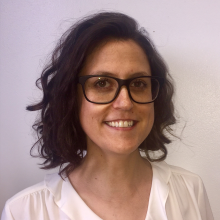August 2018 Spotlight on the SRCD Policy Fellow: Rachel McKinnon, Ph.D.
2017-2018 Federal Congressional Policy Fellow
My career goal has always been to close the gaps between children raised in low- and high-income families, to provide opportunities for children to become the best versions of themselves. I have come to believe that the solutions lie at the intersection of research and policy. Only with knowledge of what, how, and for whom interventions work can policy be introduced that makes the difference for at-risk children and youth. My year as an SRCD Congressional Fellow in the office of a federal policymaker has given me a unique insider view of how federal policy is created and how to use research in that process.
This year I had the pleasure of serving as an SRCD Congressional Fellow in the office of Senator Robert “Bob” Casey, Jr., of Pennsylvania, where I worked on education, immigration, and LGTBQ policy issues. I quickly learned that moving the policy needle in a specific area is dependent on an elaborate dance of budgets, congressional calendars, and current events. Instead of working primarily on early childhood issues as I had expected, I had the opportunity to expand my knowledge base into the world of higher education policy. Because Senator Casey was the lead Democrat in reauthorizing the Carl D. Perkins Career and Technical Education Act, I had a ground floor view of the negotiations involved in developing a piece of legislation that modernizes the way that high school and college students are trained for 21st century jobs that was ultimately passed into law.
As an ardent advocate for the health and well-being of children and families, Senator Casey and his staff invited me to share my expertise on early child development from my first day. But even more importantly, I was tapped to evaluate research across a range of policy areas to inform the team. Policymakers urge the use of research in policymaking: Passing law in today’s Federal government is an arduous and timeconsuming process and policy makers want that effort to go towards laws that will benefit the public. Research is held in high regard as a marker to move good policy and block bad policy. However, policymakers and their staff are restricted by time and resources to consume and synthesize the ever-expanding body of research. If researchers want their work to shape policy, the responsibility is on researchers to translate it to a policy audience. This year has been critical in adapting the way I will interpret and translate my future research to be useful to policymakers. Scientists have a role on the Hill: asking research questions that are relevant to policymakers and delivering that information in an effective way.
Next year, I will be continuing my research and policy training as an SRCD Executive Branch Fellow in the U.S. Department of Health and Human Services, Administration for Children and Families in the Office of Child Care. This further fellowship will complement my experience in witnessing how federal policy is written with understanding how policy is interpreted and implemented through a program office. I look forward to rounding-out my training to situate myself at the intersection of research and policy.
